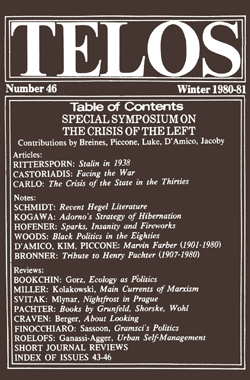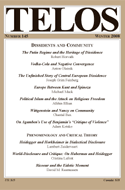This essay explores the theological and philosophical underpinnings of the work of the radical Catholic social theorist Ivan Illich (1926–2002), via a discussion of the changing meaning of charity in Western thought and practice. It is argued that Illich’s thought is animated by a traditional theological understanding of charity as anchored in local, personal bonds and networks of reciprocity, and that his critique of Western economic modernity has much to do with the gradual depersonalization and institutionalization of charity, theoretically and in society, linked to its transmogrification into “abstract” philanthropy. Drawing on debates around the nature of love and the gift in contemporary theology, philosophy, and social anthropology, the conceptual dynamics of Illich’s account of human sociality are made clear.
|
With the publication of “The Crisis of Western Societies” (1982), Cornelius Castoriadis returns to an early theme in his work by proposing that over the previous twenty years Western societies had begun to enter a new phase, one that could be considered to be a situation of crisis. In his earlier political thought—associated with Socialisme ou Barbarie—Castoriadis identified signs of a transition into this new phase, marked by a widespread bureaucratization of political decision-making that emerged alongside a general turn toward the privatization of social life. At the time of his revisitation of this theme, Castoriadis’s work had undergone what would be the first of two ontological turns: a turn that involved a radical rethinking of historicity, which understood the historical dimension of society as a socially contingent mode of creation that is central to the constitution of the world of a given society. This article reflects an articulation of his previous theme of crisis with regard to this broader rethinking of historicity throughout the 1970s, which extended political analysis into more foundational issues of social institution and cultural expression. Luigi Sturzo (1871–1959) was an Italian priest, social reformer and the founder in 1919 of the Popular Party that later became the Christian Democratic Party, and social theorist who wrote extensively about history during the last century. Regarding history, Sturzo’s great contribution is his account of the formation and development of the “International Community” as one of the concrete forms of human society subject to its general laws. Sturzo locates the roots of this concept in the Christian revelation of human equality before God and the subsequent religious duty to love one’s neighbor in a manner that transcends the traditional boundaries of the ancient world. Thus the social values of the pre-Christian world are inverted, and human personality assumes the mantle previously held by the social and ethnic bonds of that era.
Castoriadis’s analysis here is an updated version of the assessment of Russian society that had been developed within Socialisme ou Barbarie. Castoriadis makes a compelling argument that Russia had regenerated itself into a full-blown stratocracy, armed to the teeth and yet still unable to provide its citizens with a functional civic bureaucracy; a decade later he reflects that a core argument of “Facing the War” was that brute force had become the sole signification holding this society together. Castoriadis’s argument operates at two levels: as a political analysis of Russian bureaucratic spheres (the comparison of military capacity between superpowers and a critique of rational determinism within the justification of Cold War strategy—i.e., M.A.D.); and as a political judgement of the imaginary significations that served to orient Russian society. It is through the latter level that lessons on historical contingency are astutely relevant to the contemporary world situation. This is the second of three papers delivered at a seminar on religion and politics that was organized with Rowan Williams, the former archbishop of Canterbury, on the occasion of his recent book Faith in the Public Square. The seminar was held at Radboud University in December 2013. The first paper, by Martijn de Koning, appears here. The third paper, by Herman Westerink, will be posted here shortly. According to the publisher of Faith in the Public Square, “Archbishop Rowan Williams is the most gifted Anglican priest of his generation. His views are consistent and orthodox and yet he has been consistently misunderstood.” Now maybe this is just another case of misunderstanding, but I doubt, not whether Rowan Williams is the most gifted priest of his generation, but whether his views are really that orthodox. In my understanding of that term—though I should stress that my vocabulary is not first and foremost theological—Faith in the Public Square is far from an orthodox book. It is unafraid to challenge received opinions, both religious and other kinds. This for instance shows itself in Williams’s consistent challenging of a dichotomy that has long shaped Western social and political thought, namely that of Gemeinschaft versus Gesellschaft, or of community versus society. What I am referring to is the idea that there is a sharp distinction between, on the one hand, traditional social bonds based on a robust shared identity resulting in organic solidarity—that would be Gemeinschaft—and on the other hand typically modern organizations of collective life in the form of negotiated interests and impersonal contracts—which would be Gesellschaft (and I’ll stick to the German terms because these bring out the contrast most clearly). |
||||
|
Telos Press Publishing · PO Box 811 · Candor, NY 13743 · Phone: 212-228-6479 Privacy Policy · Data Protection Copyright © 2025 Telos Press Publishing · All Rights Reserved |
||||
 “Facing the War” is a translation from the first section of Devant la guerre, Cornelius Castoriadis’s least regarded work within English-speaking circles. The reason for this marginalization is its central claim that Russian society had transformed into a stratocratic regime, with increased probability for an escalation into a Third World War. Castoriadis’s critics claimed he had missed signs of perestroika and glasnost already on the horizon. Viewed from this perspective, history could not have been more cruel to Castoriadis. However, the value of his work does not depend on a predictive mode of political analysis, a point that is clearly prefaced in this work: calls for predictive accuracy ignore the radical character of historical contingency. In fact, the unexpected events put into motion later by Gorbachev only strengthen Castoriadis’s perspective in the sense that such a development represents the deeper problem of historical indeterminacy, and it is in this respect that his analysis is finely tuned to any society’s condition of historical contingency.
“Facing the War” is a translation from the first section of Devant la guerre, Cornelius Castoriadis’s least regarded work within English-speaking circles. The reason for this marginalization is its central claim that Russian society had transformed into a stratocratic regime, with increased probability for an escalation into a Third World War. Castoriadis’s critics claimed he had missed signs of perestroika and glasnost already on the horizon. Viewed from this perspective, history could not have been more cruel to Castoriadis. However, the value of his work does not depend on a predictive mode of political analysis, a point that is clearly prefaced in this work: calls for predictive accuracy ignore the radical character of historical contingency. In fact, the unexpected events put into motion later by Gorbachev only strengthen Castoriadis’s perspective in the sense that such a development represents the deeper problem of historical indeterminacy, and it is in this respect that his analysis is finely tuned to any society’s condition of historical contingency.  In her exploration of Wittgenstein’s elusive and scattered commentary on community, Chantal Bax notes the absence of an explicit understanding of community in the philosopher’s work. Though Wittgenstein often invokes communal concepts, he rarely provides any details regarding the exact nature of a proper community, or the maintenance and governance a just society requires. Bax highlights the one place where Wittgenstein succumbs to the “unfortunate metaphor” of the body politic: he suggests the Jews, marginalized by European society, resemble a “‘kind of disease, anomaly,'” a “‘swelling'” which can “‘only be considered to be a proper part of the body when the whole feeling for the body is changed'” (105). Bax reads this as a tragic and empathetic lament: Wittgenstein doubts the possibility of a renewed, welcoming society that nonetheless adheres to this same vocabulary of the political body. And it is this prophetic doubt that intensifies the crisis of community that reiterates the necessity of Wittgenstein’s rethinking of life together.
In her exploration of Wittgenstein’s elusive and scattered commentary on community, Chantal Bax notes the absence of an explicit understanding of community in the philosopher’s work. Though Wittgenstein often invokes communal concepts, he rarely provides any details regarding the exact nature of a proper community, or the maintenance and governance a just society requires. Bax highlights the one place where Wittgenstein succumbs to the “unfortunate metaphor” of the body politic: he suggests the Jews, marginalized by European society, resemble a “‘kind of disease, anomaly,'” a “‘swelling'” which can “‘only be considered to be a proper part of the body when the whole feeling for the body is changed'” (105). Bax reads this as a tragic and empathetic lament: Wittgenstein doubts the possibility of a renewed, welcoming society that nonetheless adheres to this same vocabulary of the political body. And it is this prophetic doubt that intensifies the crisis of community that reiterates the necessity of Wittgenstein’s rethinking of life together. 

